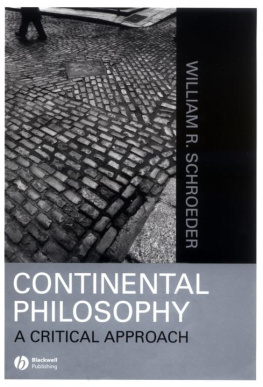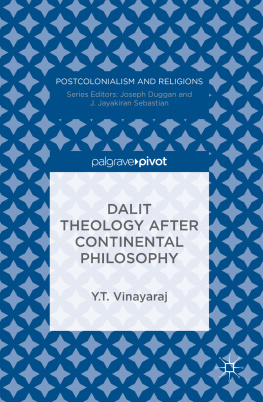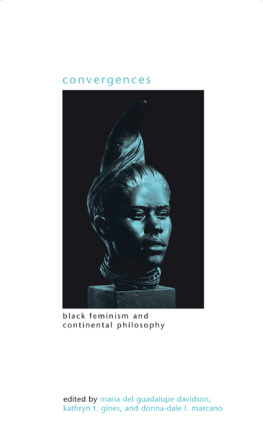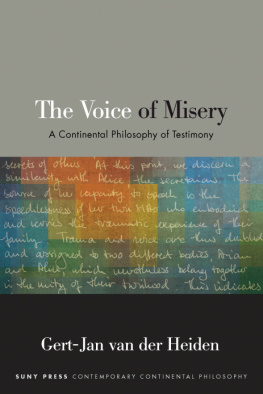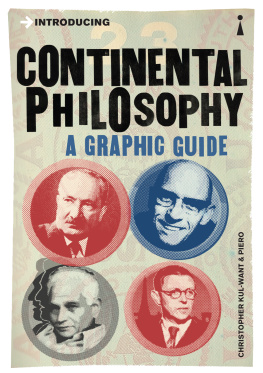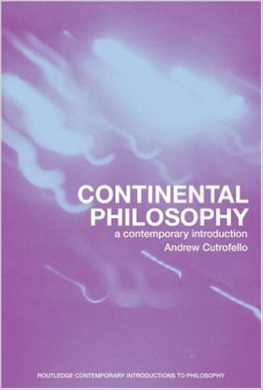William R. Schroeder - Continental Philosophy: A Critical Approach
Here you can read online William R. Schroeder - Continental Philosophy: A Critical Approach full text of the book (entire story) in english for free. Download pdf and epub, get meaning, cover and reviews about this ebook. year: 2011, genre: Religion. Description of the work, (preface) as well as reviews are available. Best literature library LitArk.com created for fans of good reading and offers a wide selection of genres:
Romance novel
Science fiction
Adventure
Detective
Science
History
Home and family
Prose
Art
Politics
Computer
Non-fiction
Religion
Business
Children
Humor
Choose a favorite category and find really read worthwhile books. Enjoy immersion in the world of imagination, feel the emotions of the characters or learn something new for yourself, make an fascinating discovery.
- Book:Continental Philosophy: A Critical Approach
- Author:
- Genre:
- Year:2011
- Rating:4 / 5
- Favourites:Add to favourites
- Your mark:
- 80
- 1
- 2
- 3
- 4
- 5
Continental Philosophy: A Critical Approach: summary, description and annotation
We offer to read an annotation, description, summary or preface (depends on what the author of the book "Continental Philosophy: A Critical Approach" wrote himself). If you haven't found the necessary information about the book — write in the comments, we will try to find it.
Continental Philosophy: A Critical Approach — read online for free the complete book (whole text) full work
Below is the text of the book, divided by pages. System saving the place of the last page read, allows you to conveniently read the book "Continental Philosophy: A Critical Approach" online for free, without having to search again every time where you left off. Put a bookmark, and you can go to the page where you finished reading at any time.
Font size:
Interval:
Bookmark:
For my mother, Adele T. Schroeder, and in fond memory of my father, Ralph W. Schroeder and of my brother, Richard A. Schroeder






I owe special debts to Frithjof Bergmann, Richard Schacht, and John Coker for reading parts of the manuscript at various stages of development and offering helpful comments. Also I would like to thank Larry May and three other anonymous referees for Blackwell Publishing, whose comments proved stimulating and helpful. I would especially like to thank my research assistant for 2003-4, Charlotte Frye, for reading the final versions of each chapter and making useful suggestions. I thank the University of Illinois Research Board for supporting her. I also thank the University of Illinois for granting me a sabbatical leave in 1999-2000 to work on this project.
I have drawn on 30 years of teaching the subjects discussed in this book, but even with such extensive experience, I cannot hope to do complete justice to all the figures treated here. That would require several lifetimes. Also, length considerations forced me to be highly selective in areas that might have received more extended treatment. A number of sections had to be dropped or reduced to make the finished manuscript a reasonable length. In the middle of the project, I was asked to co-edit Blackwell's A Companion to Continental Philosophy, and editing those essays certainly deepened my understanding of many figures discussed here.
Finally, I would like to thank the students, both graduate and undergraduate, who asked intelligent questions in my classes on this material. My hope is that this book will stimulate deeper understanding and assimilation of the Continental philosophical tradition and thus will enable the next generation of students to make more creative and better-informed contributions to, and use of, this tradition.
Post-Kantian Continental philosophy is currently experiencing a malaise - perhaps even a crisis. Both poststructuralism and postmodernism climaxed some years ago, and no replacements are on the horizon. Though those movements still have adherents, they can no longer claim to be the cutting-edge. Indeed, that edge has disappeared. Continental scholars seem to be waiting for a new movement to emerge while continuing their historical research. Few attempt to use established insights to address current problems or to advance new answers to old quandaries. Some may hope that philosophy is finally ending after all, but most are simply treading water - unsure how to proceed. This book seeks to shatter the malaise. So I shall begin by examining it further.
Both poststructuralism and postmodernism had withering effects on earlier movements in Continental philosophy. They trumpeted a paradigm shift in philosophy, abandoning the tasks of previous movements and substituting their own agendas. Poststructuralism proved especially destructive. It rejected structuralism for postulating universal, unconscious rules governing mental operations when structuralists should have realized that the complex dynamics of human action cannot be explained in this way. It dismissed phenomenology for failing to establish the accuracy of its reflective self-descriptions and the universality of its discoveries. Instead of allowing that the mind might know itself directly, poststructuralists insisted that consciousness always exists at a distance from itself and is conditioned by factors it cannot fathom. They challenged the phenomenologists' claim to self-knowledge. They also chided hermeneutics for presupposing that organic unity is a necessary condition for adequate interpretations. Instead, they advocated an interpretative creativity that would rival that of artists - the more flamboyant and outrageous, the better. They eviscerated existentialism for its humanism and individualism, instead insisting on the "death of the subject" and the rootedness of persons in social relations. Arguing that "man" is no longer a viable philosophical concern, poststructuralists insisted on the dominating influence of power and historically specific rules governing agency and thought. Because they rejected historical dialectics - whether based on economic forces or a self-developing pattern of concepts or types of consciousness - poststructuralists abandoned Hegel and Marx. They viewed the totalizing feature of dialectical systems - their claim to incorporate all other positions - as repressive because it allegedly ignores everything that fails to fit the system. Poststructuralists also questioned the dialectician's claim to occupy an absolute standpoint that could adjudicate all others. Though they praised Nietzsche, they ignored his efforts to revitalize philosophy to overcome the crisis of nihilism. Instead, poststructuralists welcomed and fueled it. Foucault's epistemic breaks, Derrida's differance, and Deleuze's rhizomes challenged aspirations to provide unchanging truths that characterized previous Continental movements.
Beyond these criticisms, however, neither poststructuralism nor postmodernism produced a widely accepted program for Continental philosophy despite modest efforts to do this. Foucault's late ethics of freedom seemed to be a rehashed version of existentialist authenticity, subject to the same objections. His theory of power seemed unhelpful in analyzing specific struggles and failed to justify new goals through which a convincing critique of the current order could be mounted. It applied equally to all political possibilities and so favored none. This became obvious during the rise of postmodernism, whose proponents seemed almost infatuated with the current era and thus abandoned the search for alternatives. Because it could be used against any author, Derrida's deconstruction also left philosophy stalled - spinning its wheels uselessly - even if this was not his actual goal. Deleuze introduced an alternative vision of philosophy (as conceptual creation) and attempted to renew process-philosophy, but he won few adherents, and even his disciples had difficulty applying his insights. Collectively, however, the poststructuralists silenced all other contenders in Continental thought (an ironic result given their opposition to silencing minorities). Though partisans of other approaches continued their investigations, few believed their efforts would influence the future of Continental philosophy.
Font size:
Interval:
Bookmark:
Similar books «Continental Philosophy: A Critical Approach»
Look at similar books to Continental Philosophy: A Critical Approach. We have selected literature similar in name and meaning in the hope of providing readers with more options to find new, interesting, not yet read works.
Discussion, reviews of the book Continental Philosophy: A Critical Approach and just readers' own opinions. Leave your comments, write what you think about the work, its meaning or the main characters. Specify what exactly you liked and what you didn't like, and why you think so.

